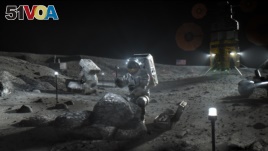04 May 2020
The American space agency NASA is looking to private industry to build lunar landers. When completed, the spacecraft will be the first to take astronauts to the surface of the moon in almost 50 years.
NASA Administrator Jim Bridenstine announced last week that three businesses will develop, build and fly the lunar landers. The three are SpaceX from California; Blue Origin of Washington State; and Dynetics of Alabama.
Dynetics is part of Leidos, the business formerly known as Science Applications International Corporation.

This illustration made available by NASA in April 2020 depicts Artemis astronauts on the Moon. On April 30, 2020, NASA announced the three companies that will develop, build and fly lunar landers, with the goal of returning astronauts to the moon by 2024. (NASA via AP)
Altogether, the space agency has agreed to pay the three companies a total of $967 million for the first 10 months of the project.
The goal is to return astronauts to the moon in 2024.
Bridenstine said, "This is the last piece that we need in order to get to the moon" by 2024. He noted it will be the first lunar lander since NASA's Apollo 17 mission in 1972. That was the last time people walked on the moon.
Over the next 10 months, each company will improve its design for a lunar lander. NASA officials will decide which lander to test first.
Bridenstine said the space agency will go with the company that has the highest chance of success by the year 2024.
NASA will use its own Orion capsules and Space Launch System megarockets to launch astronauts to the moon. The Orion spacecraft and rockets are still under development.
Of the three awarded contracts, Blue Origin will receive more than half the total amount— $579 million. SpaceX got $135 million. Dynetics will receive $253 million.
SpaceX's proposed Starship lander is so tall that astronauts will use an elevator to get to and from the surface of the Moon.
Blue Origin's version will come with a big ladder, based on artists' images of the proposed lander.
The Dynetics lander is so low to the ground that astronauts will need only a few steps to reach the moon's surface. NASA gave the design high marks for safety and efficiency.
Just last November, SpaceX and Blue Origin were among the companies that won contracts to transport cargo to the moon.
NASA wants the new Artemis moon-landing program to continue for some time, with several trips expected to different areas on the lunar surface.
While only one company will carry the first woman and next man to the moon's surface, all three will participate in the lunar landing program, officials noted.
By learning how to live and work on the moon, NASA will be better able to eventually send astronauts to Mars, Bridenstine said.
In a video call with reporters, Elon Musk of SpaceX noted the "potential for an incredibly exciting future in space."
Dynetics vice president of space systems, Kim Doering, said her team is excited not just about 2024 but the long-term lunar economy.
Blue Origin's chief Bob Smith was among those pleased with the announcement. "Going to the moon is the reason why we got into this business," he said.
I'm John Russell.
Marcia Dunn reported on this story for the Associated Press. John Russell adapted it for VOA Learning English. George Grow was the editor.
We want to hear from you. Write to us in the Comments Section.
_____________________________________________________________
Words in This Story
capsule – n. a small container
contract – n. a business agreement
elevator — n. a machine used for carrying people and things to different levels in a building
ladder – n. a structure used for climbing up or down something
efficiency – n. the ability to do something or produce something without wasting materials, time, or energy; the quality of being efficient
cargo – n. something that is carried from one place to another by boat or airplane
participate – v. to be involved with others in doing something; to take part in an activity or event with others
excite – v. to cause strong feelings or interest